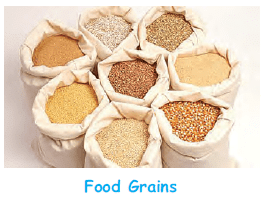Our Food Class 3 Notes SST
People living in different parts of the country eat different food grains. Reason can be the easy availability, climatic conditions and long tradition. Generally the food grains eaten are wheat, rice, maize and even millets in a few places. Pulses like Arahar, Moong, Masur and others are eaten in some form or other. Beans such as Rajma, Lobia, Peas etc are also popular as food.

Besides, vegetables form an essential part of our food. Many kinds of oils are used as medium to cook food. Generally these oils are derived from seeds of plants; therefore, these are called vegetable oils. Coconut oil, mustard oil, sunflower seed oil, groundnut oil, sesame and soya bean oil are commonly used to cook food. Ghee as medium of cooking is favored in some part of India.

Seasonal fruits are used in many forms to supplement the food.
Spices add flavour and sharpness in food.

Milk and milk product bring variety to food.

A large number of people supplement their food with eggs, fish, lamb, pork and marine products. People who do not take meat products are called vegetarian. Sweetmeats provide delicious addition to our meals.

Quick means of transportation, better farming and improved seeds have made every vegetable and fruit available round the year.
"Balanced food is needed to make you grow, remain healthy and give enough energy to work hard and play hard. Healthy food meets your need of carbohydrate, protein, fat, minerals and water."
|
15 videos|85 docs|22 tests
|
FAQs on Our Food Class 3 Notes SST
| 1. What is the importance of food in our daily lives? |  |
| 2. What are the main nutrients present in food? |  |
| 3. How does the food we eat affect our health? |  |
| 4. What are some common dietary requirements and restrictions? |  |
| 5. How can we make healthier food choices in our daily lives? |  |

|
Explore Courses for Class 3 exam
|

|

















